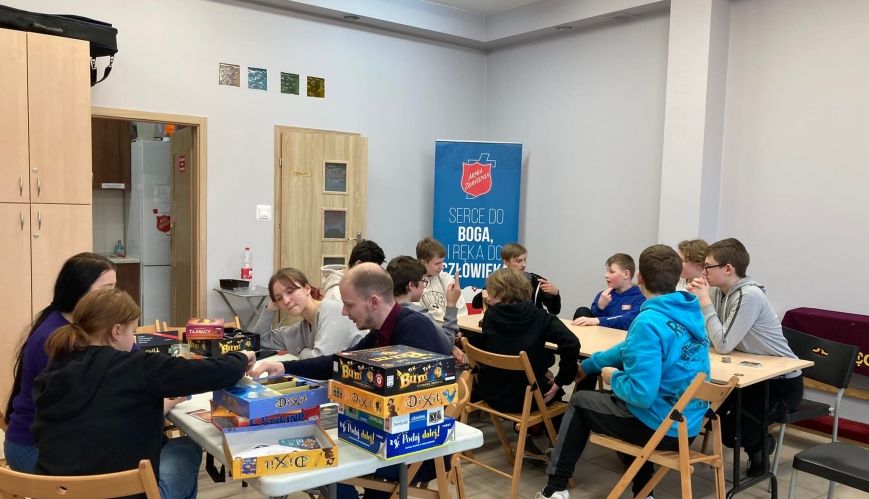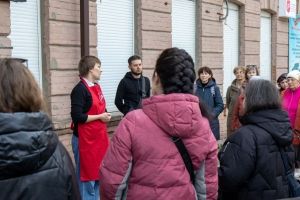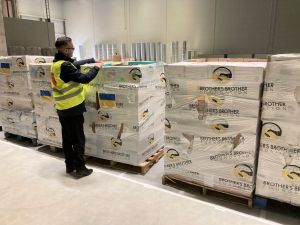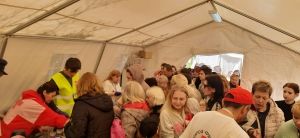Salvos provide support, and friendship, to Ukrainian refugees

Salvos provide support, and friendship, to Ukrainian refugees
Some lonely teenage refugees from Ukraine found friendship, fun, and support with The Salvation Army youth group in Warsaw, Poland.
One of the challenges faced by refugees fleeing their country is loneliness.
“This is especially felt by children and young people who have to start their studies in a new place, with new people, and they are often missing old friends,” says Captain Oleg Samoilenko, a corps officer in Warsaw, Poland, serving refugees at the border with Ukraine.
The Salvos in Warsaw invited some teenage refugees, some of who had to flee without their parents, to the youth meeting for some board games.
“Unexpectedly, nine guys came,” said Oleg. “They didn’t know each other before but quickly became friends. There was laughter and joy on their faces. Later, one of them sent a text message: ‘Thank you for the new family. Now The Salvation Army is like my home, where my friends are. I'm not alone anymore.’
“Despite the fact that we spoke in three languages, we felt good together, and I am glad that in this way we can help them to forget about the war for at least a little bit. They call me Uncle Oleg, and I am happy to be part of their new life.”
Eastern Europe update
“Our officers, soldiers, and volunteers have stepped up to the challenge and are caring for those fleeing the violence,” said Colonel Kelvin Pethybridge, Territorial Commander of the Eastern Europe Territory. “I am very proud of the response from our people and the way they continue to serve.”
Ukraine
As the Salvos continue to reach out to displaced people and those fleeing the war, the situation in Ukraine is becoming more difficult.
In Kharkiv, the officers can’t use bank or corporate credit cards, so must use cash. Supplies are very difficult to find.
In Dnipro, the officers don’t want to leave the country as they are helping many people, but they must find somewhere to shelter.
 In Dnipro, the Salvos are reaching out to those who are traumatised and displaced.
In Dnipro, the Salvos are reaching out to those who are traumatised and displaced.
In Kropyvnytskyi, officers and volunteers are seeing more than 200 people per day, and the number is increasing. They are only able to purchase limited supplies.
In Lviv, corps are receiving weekly pallets of aid from Poland, arranged through The Salvation Army’s International Emergency Services. The officers have had discussions with the local government about establishing a camp for people that has kitchen and bathroom facilities. They are hopeful that a school may be made available for this purpose.
In Vinnytsia, the corps officer travelled to Lviv to pick up aid, dropping some off at Kropyvnytski on the way back. It is hoped that this will continue.
 A Salvos warehouse in Poland is being used to get emergency aid into Ukraine.
A Salvos warehouse in Poland is being used to get emergency aid into Ukraine.
Moldova
Moldova has sent two Russian-speaking officers and a cadet to the border with Romania. They are distributing food items and information, including anti-human-trafficking flyers.
Different corps are also distributing food parcels to an increasing number of people through two main centres. A third centre is also under consideration. When refugees first arrived, they had some finances. This is no longer the case, so they need additional assistance.
Romania
The teams continue to work at the border, although the numbers are slowing down. There is a higher number of people in Bucharest, which has meant that the work has risen in the capital. The need remains high.
The Salvation Army is also assisting at a government site, ‘Romexpo’, giving out vouchers and parcels of food and clothing. More than 5000 people have been assisted during the last two weeks.
As Ukrainians begin to find work in Romania, people are coming to The Salvation Army for information regarding employment, as well as education for children.
 Officers from the newly-formed Salvos in Bulgaria are assisting refugees fleeing Ukraine.
Officers from the newly-formed Salvos in Bulgaria are assisting refugees fleeing Ukraine.
Bulgaria
Two Russian-speaking officers from Bulgaria joined the Red Cross at the border with Romania. They are assisting with the distribution of food parcels, hot meals, and a listening ear. In the last several days, they assisted 400 people.
Georgia
Georgia is now starting to see displaced people from Ukraine who have travelled through Russia. In Batumi and Tbilisi, The Salvation Army is providing assistance, including food parcels, hygiene supplies, clothes, and blankets.